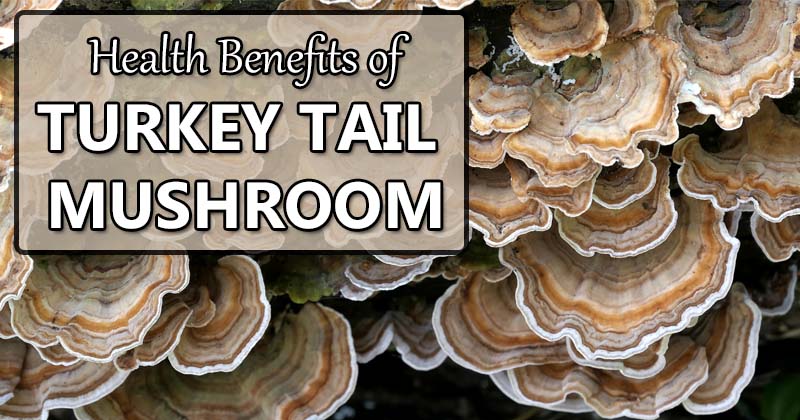Recently, turkey tail mushroom has gotten a lot of attention, especially as a treatment for cancer. There is tons of research to back up its anti-cancer benefits and even a Ted Talk about it. But the compounds in turkey tail mushroom also have many other benefits. Here is what the research has to say about turkey tail health benefits and whether it is worth taking.
What Is Turkey Tail Mushroom?
Turkey tail (Trametes versicolor) is a mushroom which has distinct striped bands on it. The bands are usually grey or brown but can come in other colors too. The underside of the mushroom has whitish tiny pores underneath.
Turkey tail mushroom has a mild and sweet taste. It’s definitely easier to take than most other medicinal mushrooms, which tend to have a strong, gross taste!
Other names for turkey tail mushroom:
- Trametes versicolor
- Yun Zhi
- Kawaratake
- Krestin
Main Healthy Compounds in Turkey Tail Mushroom
Turkey tail mushroom contains polysaccharopeptide (PSP) and polysaccharide-K (PSK). These compounds have repeatedly been shown to inhibit cancer cell growth. In Japan, PSK is even an approved adjuvant treatment for cancer.
Research shows that PSP and PSK have many other benefits outside of cancer treatment. There are also many other compounds in turkey tail mushroom which can provide health benefits, though these haven’t been as well-researched. (1, 2, 3, 4)
Turkey Tail Mushroom Benefits
Below are the main benefits of turkey tail mushroom aside from fighting cancer. Because it is relatively easy to grow or forage turkey tail, it is generally more sustainable and affordable than other medicinal mushrooms.
1. Boosting Immunity
Turkey tail mushroom contains more than 35 different phenolic antioxidants. Various studies have also shown that the mushroom triggers a strong immune response, such as inducing the body to produce lymphocytes and monocytes. There is also some evidence that PSK might help people with immune deficiencies. However, more research is needed. (5, 6)
2. Gut Health
Evidence shows that PSP in turkey tail mushroom helps keep gut bacteria balanced. Unbalanced gut bacteria is linked to depression, autism, heart disease, obesity and numerous other conditions. In this sense, turkey tail mushroom could help treat a variety of health issues. There is also evidence that turkey tail mushroom treats colitis. (7, 8, 9 , 10 , 11)
3. Neuroprotective
There is some evidence that the antioxidants in turkey tail mushroom might protect neurological health. It may help protect the brain from oxidation and deterioration. Its anti-inflammatory and antioxidant properties could also protect the brain from conditions like dementia. (12, 13, 14)
4. Osteoporosis
Many medicinal mushrooms, including turkey tail mushroom, have been shown to have benefits for bone health. Research shows that it helps reduce bone loss and prevent osteoporosis by acting on osteoblast bone cells. (15, 16, 17)
5. Anti-Viral
Turkey tail mushroom is a very powerful anti-viral agent. Studies have shown that it is effective in fighting influenza, herpes simplex virus 2, HPV and numerous other viruses. The antiviral properties of turkey tail mushroom were even stronger than several other species of medicinal mushrooms, making it one of the best choices for fighting viruses naturally. (18, 19)
Do Turkey Tail Supplements Really Work?
There is plenty of clinical research which shows that turkey tail mushroom has health benefits. But, just like with any other natural supplement, whether or not turkey tail will work for you depends on a lot of factors. A major factor is the type and quality of the supplement. In particular, you need to pay attention to whether the supplement is made from the mycelia or fruiting body part of the mushroom.
For more information, see this article on the different types of turkey tail mushroom supplements.

